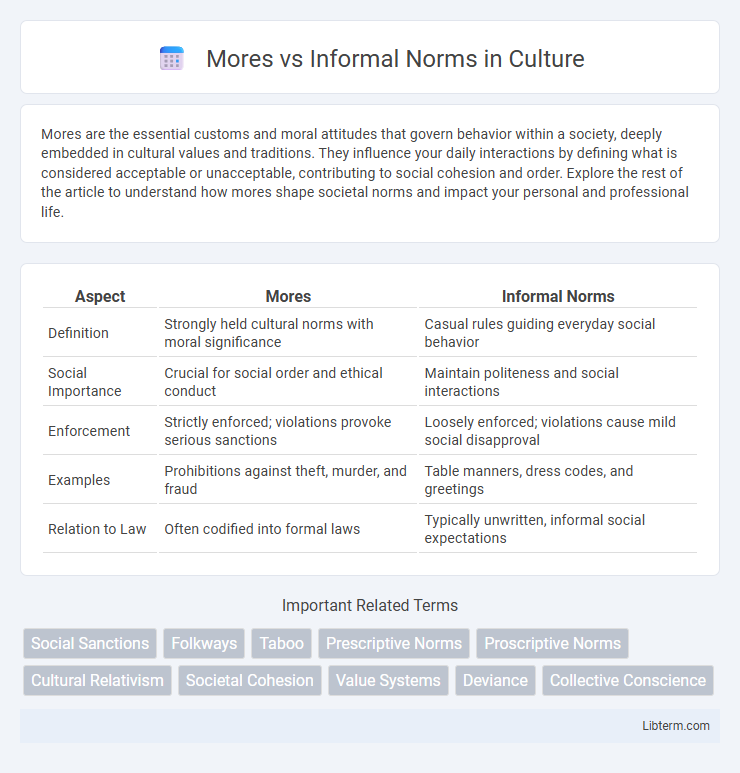Mores are the essential customs and moral attitudes that govern behavior within a society, deeply embedded in cultural values and traditions. They influence your daily interactions by defining what is considered acceptable or unacceptable, contributing to social cohesion and order. Explore the rest of the article to understand how mores shape societal norms and impact your personal and professional life.
Table of Comparison
| Aspect | Mores | Informal Norms |
|---|---|---|
| Definition | Strongly held cultural norms with moral significance | Casual rules guiding everyday social behavior |
| Social Importance | Crucial for social order and ethical conduct | Maintain politeness and social interactions |
| Enforcement | Strictly enforced; violations provoke serious sanctions | Loosely enforced; violations cause mild social disapproval |
| Examples | Prohibitions against theft, murder, and fraud | Table manners, dress codes, and greetings |
| Relation to Law | Often codified into formal laws | Typically unwritten, informal social expectations |
Understanding Mores and Informal Norms
Mores represent deeply held social norms that dictate moral behavior and are often codified into laws, reflecting a community's core values and ethical standards. Informal norms guide everyday behavior through unwritten rules and social expectations, maintaining social order without legal enforcement. Understanding mores and informal norms is crucial for recognizing how societies differentiate between essential ethical principles and routine social practices.
Defining Mores: Core Social Rules
Mores represent the core social rules that govern ethical behavior and moral standards within a society, often carrying significant penalties if violated. These norms define what is considered right and wrong, shaping fundamental social values and maintaining social order. Unlike informal norms that guide everyday etiquette, mores enforce deeply held beliefs crucial to community cohesion.
What Are Informal Norms?
Informal norms are unwritten social rules that govern everyday behavior within a community, shaping interactions through shared expectations rather than legal enforcement. Unlike mores, which are strongly held norms with moral significance and clear consequences for violations, informal norms are more flexible and subtle, often enforced through social approval or disapproval. These norms help maintain social order by guiding customary practices, etiquette, and traditions without formal codification.
Key Differences: Mores vs Informal Norms
Mores are strong social norms rooted in a society's core values, often linked to morality and enforced through formal sanctions, whereas informal norms guide everyday behavior without legal consequences. Mores carry significant social importance and violations can result in severe disapproval or punishment, while informal norms shape casual interactions and are maintained through social acceptance and peer pressure. Understanding the distinction between mores and informal norms is crucial for analyzing societal expectations and cultural enforcement mechanisms.
The Role of Mores in Shaping Society
Mores are deeply ingrained social norms that dictate moral behavior and maintain societal order by distinguishing between right and wrong. These norms influence laws, ethical standards, and collective values, ensuring cohesion and stability within communities. Unlike informal norms, mores carry significant moral weight and often provoke strong reactions when violated, reinforcing their role in shaping societal conduct and cultural identity.
Functions and Features of Informal Norms
Informal norms function as unwritten social rules that guide everyday behavior and maintain social order through peer influence and shared expectations. They feature flexibility, contextual sensitivity, and enforce conformity without formal sanctions, relying on social approval or disapproval. These norms facilitate social cohesion by promoting predictability and cooperation within groups.
Cultural Significance of Mores
Mores represent deeply held cultural norms that dictate essential moral behaviors within a society, carrying significant social weight and often codified into laws. These norms shape community identity by reinforcing collective values such as justice, respect, and integrity, distinguishing fundamental ethical standards from informal norms. Informal norms, while socially accepted and influential, lack the moral gravity of mores and typically regulate everyday interactions rather than core ethical principles.
Everyday Examples of Informal Norms
Everyday examples of informal norms include greeting people with a handshake or a smile, queuing patiently in public places, and using polite language when requesting help. These unwritten social rules guide behavior and maintain social harmony without the force of law, unlike mores which are strict norms often tied to moral or ethical values, such as prohibitions against theft or murder. Informal norms vary across cultures but consistently shape daily interactions by promoting respect and cooperation in community settings.
How Mores and Informal Norms Influence Behavior
Mores represent deeply held societal norms that dictate moral standards and are often enforced through formal sanctions, profoundly shaping behavior by promoting conformity to core ethical values. Informal norms, by contrast, guide everyday social interactions through unwritten rules and peer pressure, influencing behavior by encouraging acceptance and social cohesion within groups. Both mores and informal norms significantly impact individual conduct by establishing expectations that govern moral judgment and routine social practices.
Evolving Social Norms: Changes in Mores and Informal Norms
Evolving social norms reflect shifting cultural values, where mores--strongly held norms related to morality and ethics--become more flexible or redefined in response to societal changes. Informal norms, which guide everyday behavior and etiquette, adapt more rapidly to trends, technology, and increased social interaction, shaping new expectations for conduct. This dynamic interplay between changing mores and evolving informal norms highlights the fluid nature of social regulation and collective behavior in contemporary societies.
Mores Infographic

 libterm.com
libterm.com